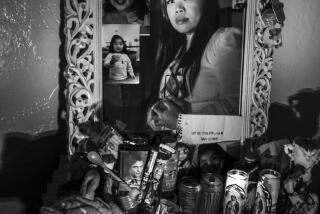A Year-End Review: Tying Up Some of the Loose Ends From ’84 : Lobbying for Rights
- Share via
It’s been slightly more than a year since 17-year-old Michelle Crandall hanged herself in the garage of her mother’s Costa Mesa home. Along with the more common upsets of adolescence, Michelle was plagued by the fact that she was a dwarf. She ultimately found it impossible to cope with being different in a society that has tended not to recognize the special needs of short-statured people.
As reported in View last June, Michelle’s father, Richard Crandall, quit his job as an electronics salesman three months after the teen-ager’s death. Founding the nonprofit Short Stature Foundation and Information Center, Crandall proceeded to devote all his time to lobbying for the rights of little people, and increasing public awareness of what it means to be short-statured.
Since that time, Crandall, also a dwarf, has worked with doctors to compile a list of more than 50 physical abnormalities that may occur in short-statured people. He believes the list will add substance to his campaign to have short stature officially recognized as a disability, a move that would make little people who needed it eligible for financial assistance. Many of the physical disabilities on the list may be corrected or minimized by early detection, Crandall said, so it is important that this and other information be readily available to short-statured people and their parents.
Crandall is now in the process of establishing what he says is the first public information center for short stature in the country. The library has accumulated more than 130 articles on the condition. Although he’s now working from his Huntington Beach home, Crandall hopes that the new center will soon be self-supporting and will relocate in a separate office. He is also acquiring a computer to increase the foundation’s capacity to store information.
Public access to information on all aspects of short stature--including psychological issues, as well as vocational and genetic counseling--is crucial, he said, so that little people won’t feel isolated from one another, as has often been the case previously. Crandall said that he has received letters from parents who said it was only after hearing about Michelle’s suicide that they found the strength to discuss what it means to be different with their own short-statured child. Such open discussion, Crandall hopes, may avert another tragedy.
More to Read
Sign up for Essential California
The most important California stories and recommendations in your inbox every morning.
You may occasionally receive promotional content from the Los Angeles Times.









